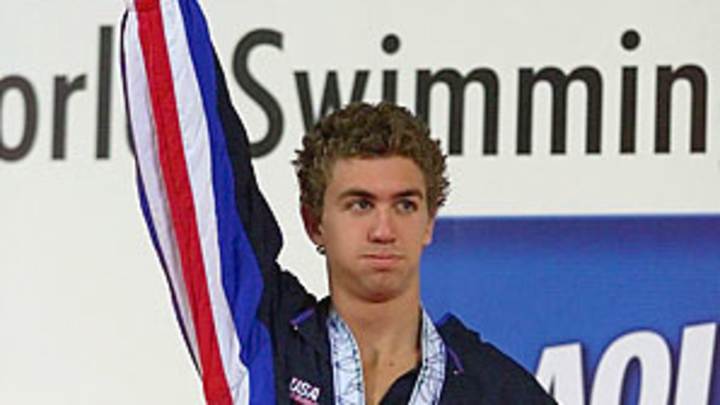Former Olympian Ervin attempting a comeback after mysterious layoff

CHARLOTTE, N.C. -- Anthony Ervin isn't revealing everything about the last eight years of his life. The parts he does share make you wish he would.
Ervin won the 50-meter freestyle at the 2000 Sydney Olympics after becoming the first swimmer of African-American heritage to make the U.S. Olympic team. He tied for gold, actually, with best friend Gary Hall Jr. and added silver in the 4x100 freestyle relay. He was 19 years old, fresh off graduating near the top of his class at a Southern California high school, ticketed for NCAA greatness at Cal-Berkeley and many more Olympic medals.
There would be no more Olympics. He doesn't know where either 2000 Olympic medal is now after a cryptic eight-year retirement. Ervin resurfaced in masters-age meets late last year. Few thought much of his comeback, but Ervin popped eyes in his all-intents debut, the Austin Grand Prix in January. He swam the 50 free in 22.27 seconds. He won the 2000 Olympics in 21.98, but the 22.27 (and 22.24 in March) ranks him second among Americans this year. The top two at the Olympic trials on July 1 will go to London. Ervin, at 30, could be the oldest member on the team.
"It feels like I'm as good now as when I stopped swimming," Ervin said at Charlotte UltraSwim, the last major grand prix meet before trials.
Ervin swept the 50 and 100 freestyles at the 2001 world championships and won four individual NCAA championships competing for Cal through 2003. He retired later in 2003, losing interest in the demands of being a world-class swimmer at age 22.
"I still had a lot of angst and resistance towards pushing the direction I'd always been going," Ervin said. "I really just needed freedom.
"So I took it."
Cal women's coach Teri McKeever saw it coming.
"Whether that was good or bad, he went on his own path," said McKeever, whom Ervin started his comeback with in spring 2011 while pursuing his master's degree. "A lot of people aren't willing to do that, especially when there's a lot of people saying, 'What the hell are you doing?'"
And what exactly did he do?
"A lot of growing up," Ervin said. "Went on a lot of adventures."
What those adventures were, Ervin won't say.
"Bullfighting," he joked. "Moon landings."
It's been reported he took up rock music in New York, rode motorcycles and started smoking. He auctioned the Olympic gold medal on eBay for $17,100 and gave it all to 2004 Asian tsunami relief. He simply lost the silver medal. Ervin said he hasn't lived in the same place for longer than nine months over the last nine years. He looks nothing like the 19-year-old baby face from Sydney.
From the top down, his buzz cut's been replaced by unsettled brown curls. He wears black Ray-Ban glasses when not goggled. The silver-looped earrings from 12 years ago are gone, but the piercings haven't closed. And then there are the tattoos.
"I had no tattoos at 19," said the 6-foot-2 Ervin, who's now inked up and down both arms. "It's a narrative of skin."
A story he's saving to share at a later date (his friend, Constantine, has verbal rights to the eight years off). Ervin wore a black zip-up jacket, the only visible body art a red rose on top of his left hand. He gestured and spoke of hubris over his swimming accomplishments, a mystical phase and made a biblical reference.
Ervin said he got his feet wet coaching swimming in Manhattan during his retirement. A teaching itch urged him to move back to Berkeley to finish his undergraduate studies in English in 2010 and then keep studying education. Early the next year, looking to exercise, he asked McKeever if he could do some swim workouts.
"When he got in the water," McKeever said, "it was beautiful. He's just really got a gift, a great relationship with the water."
McKeever was careful not to push Ervin into competition, but Ervin was two months behind on rent payment. So he started to swim competitively again for the money, at least partly. The same guy who passed up endorsement contracts after the 2000 Olympics so he could retain NCAA eligibility.
"It was quite organic from the point of me kind of starting the lifestyle of being the swimmer again into gradually just being like maybe I should go to a competition," Ervin said. "Now I'm doing quite well."
Ervin will likely swim the 50 and 100 free at the Olympic trials. Nathan Adrian is the only man head and shoulders above the rest of the field in those sprint events. Ervin is ranked second to Adrian in the splash-and-dash 50, where the top two make the Olympic team. The top six in the 100 will make the Olympic relay team. Ervin is the ninth-fastest American in that event this year.
"I certainly believe I'm a contender, but I also believe that the field is deep, that the names that are out there are going to be very difficult," Ervin said. "These are guys that have been training for the last four years and beyond as well as you never know who is going to come out of nowhere, like I did when I was 19."
Ervin speaks frequently to child swimmers at clinics and was inducted into the Boys & Girls Club Hall of Fame last week. He's often been asked to recount his gold-medal story. What's happened since is worthy of mention, too.
"I was very much like wet clay," Ervin said. "The impressions that were being made, it was the world pushing those impressions in more than I felt like I was agreeing to what was going on.
"If it was wet cement, now it's dry. I'm a boulder, and I'm going to start rolling downhill ... very fast."
